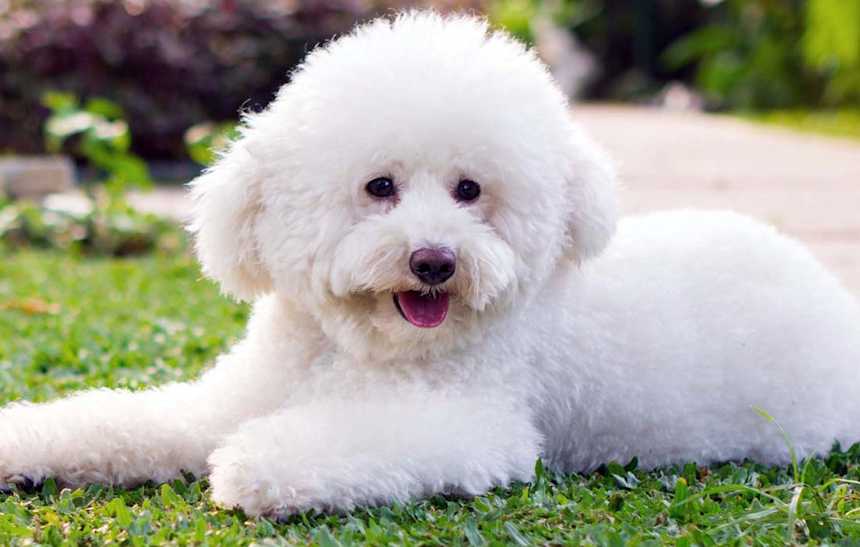Yes, Toy Poodles shed, but they are known for being low-shedding dogs, which makes them a good choice for people who have allergies or prefer a cleaner home with less dog hair.
Toy Poodle
Breed Type: Toy
Coat: Curly
Hypoallergenic: Yes, they may not trigger allergies.
Temperament: Intelligent, affectionate, eager-to-please, friendly
Life expectancy: 14-18 years
Color & patterns:

Looking for a pint-sized pooch with plenty of personality? The Toy Poodle is your dog. This breed may be small in stature but is big on charm and intelligence. The Toy Poodle is also sure to turn heads wherever they go, thanks to their elegant, curly coat often styled in showy haircuts ranging from a classic pom-pom to an intricate lion’s mane. The Toy Poodle’s coat is also low-shedding, making them a potential companion for those with allergies.
Toy Poodle characteristics
Learn about about Toy Poodle basics like their fur colors, shedding levels, how much grooming they need, and other Toy Poodle facts.
Average height
7-10 inches (17.8-25.4cm)
Average weight
2-9 pounds (0.9-4.1 kg)
Average lifespan
14-18 years
Exercise needs
Grooming needs
Full-grown size
Good with cats
Good with kids
Training aptitude
What colors do Toy Poodles come in?
Toy Poodles come in a variety of colors, including black, white, brown, apricot, gray, silver, and red. They can also have multi-colored coats with patterns like parti-color or phantom. Of the over 25 color combinations for Toy Poodles, the AKC recognizes 11 colors as breed standard, including apricot, black, blue, brown, brown and white, café au lait, gray, red, silver, silver beige, and white. One of the most common colors for Toy Poodles is pure black.
How big do Toy Poodles get?
Toy Poodles typically stand under 10 inches tall at the shoulder and weigh between four to six pounds when fully grown.
How long do Toy Poodles live?
On average, Toy Poodles have a lifespan of about 10 to 18 years. Proper care, nutrition, and regular vet check-ups can help them live a healthy and happy life for even longer.
When do Toy Poodles stop growing?
Toy Poodles typically reach their full adult size by the time they’re six to eight months old. After this age, they generally stop growing in terms of height, although they might continue to fill out a bit more in terms of muscle and weight.
Which is smaller, a toy or miniature poodle?
Between a Toy Poodle and a Miniature Poodle, the Toy Poodle is smaller in size. Toy Poodles usually stand under 10 inches tall at the shoulder, while Miniature Poodles are taller, typically ranging from 10 to 15 inches at the shoulder.
Toy Poodle history
Learn about where the Toy Poodle came from.
What were Toy Poodles bred for?
Toy Poodles were bred both as companions for people, especially in the European aristocracy in the 18th century and as hunting dogs. Their small size made them ideal for indoor living, and they were often kept as lap-dogs.
Toy Poodle temperament
Learn about about the Toy Poodle temperament and how well they fit into your lifestyle, home environment, and family.
Are Toy Poodles good with kids?
Yes, Toy Poodles can be good with children, especially if they are introduced and socialized with them from a young age. As long as you take proper precautions, Toy Poodles can be a fun companion for your little ones. Poodles love to play, and your kids and your Poodle will have lots of fun running after each other and tiring each other out.
However, due to their small size, it’s important to teach kids how to handle Toy Poodles (as well as any dog breed) gently and respectfully to prevent any accidental injuries. It’s also important for pet parents to teach their dogs how to gently interact with children
Are Toy Poodles aggressive?
No, Toy Poodles are not known for being aggressive. Like any other breed, their behavior largely depends on their upbringing, socialization, and training. With proper care and socialization from an early age, Toy Poodles are typically friendly and well-mannered dogs.
If you are concerned by any signs of aggression or reactivity in your dog, be sure to address it promptly with the help of a professional trainer or behaviorist. Pain, discomfort, or underlying medical conditions can sometimes contribute to changes in a dog’s behavior, so it may also be worth visiting a vet to rule out their health as a cause for signs of aggressive behavior.
Do Toy Poodles bark a lot?
Yes, Toy Poodles can be vocal and may bark to alert their pet parents of visitors or other changes in their environment. However, with proper training and socialization, you can help manage their barking habits.
Are Toy Poodles good dogs?
Yes, Toy Poodles are considered good dogs. They are intelligent, affectionate, and trainable. They also often form strong bonds with their pet parents and can be great companions for people with the time and commitment to provide them with proper care and attention.
Are Toy Poodles good with cats?
Yes, Toy Poodles can get along well with cats, especially if they are introduced to each other gradually and supervised during their initial interactions. With proper socialization and training, they can live harmoniously with feline family members.
Are Toy Poodles good with other dogs?
Yes, Toy Poodles are usually friendly and can be good companions for other dogs. Proper introductions and socialization are key to ensuring they get along well with other dogs in the household or during outings.
Are Toy Poodles hard to train?
No, Toy Poodles aren’t hard to train because they are intelligent and eager to please. However, like all dogs, they benefit from consistent training, positive reinforcement, and patience. Starting training early and maintaining a consistent routine can help them learn commands and good behaviors effectively.
Are Toy Poodles smart?
Yes, Toy Poodles are smart dogs. They are quick learners and often excel in obedience training and various canine sports. Their intelligence and eagerness to please make them highly trainable companions.
Are Toy Poodles good apartment dogs?
Yes, Toy Poodles can make excellent apartment dogs due to their small size and low-shedding coat. They are adaptable to various living environments, including apartments, as long as they receive enough exercise, mental stimulation, and attention from their pet parents. Regular walks and playtime can help keep them happy and healthy in an apartment setting.
Are Toy Poodles easy to potty train?
Yes, Toy Poodles can be relatively easy to potty train, especially if you start early and maintain a consistent schedule. Their intelligence and eagerness to please can make the potty training process smoother, but it still requires patience, consistency, and positive reinforcement.
Can a Toy Poodle be a service dog?
Yes, Toy Poodles can make excellent service dogs. Their intelligence, trainability, and compact size make them well-suited for various service roles, such as assisting individuals with disabilities or providing emotional support.
Can Toy Poodles swim?
Yes, Toy Poodles can swim, but not all of them are naturally inclined to enjoy water activities. It’s important to introduce them to water gradually and ensure they feel comfortable and safe. Always supervise them around water to ensure their safety, especially if they are not experienced swimmers. Some Toy Poodles may need a little encouragement and training to become confident swimmers.
Are Toy Poodles affectionate?
Yes, Toy Poodles are known for their affectionate nature. They often form strong bonds with their pet parents and enjoy being close to them, whether cuddling on the couch or following them around the house.
Are Toy Poodles calm?
While Toy Poodles have a lively and playful side, they can also be calm and relaxed, especially when they are well-exercised and content. Providing them with enough mental and physical stimulation can help maintain a balanced and calm demeanor.
Are Toy Poodles clingy?
Yes, some Toy Poodles can be clingy and prefer to be near their pet parents most of the time. This trait often stems from their desire for companionship and can make them excellent lap-dogs. However, it’s important to establish boundaries and encourage independence to prevent them from becoming overly dependent or anxious when left alone. Proper training and socialization can help strike a healthy balance between affection and independence.
Are Toy Poodles fragile?
Toy Poodles are small and delicate in size, which can make them appear fragile. While they are not as robust as larger breeds, they are not overly fragile when properly cared for. With gentle handling and proper supervision, Toy Poodles can thrive and lead active lives.
Toy Poodle health
Learn about about the Toy Poodle health outlook and what diseases they may be prone to at various stages of their life.
Do Toy Poodles have health problems?
Like all breeds, Toy Poodles are prone to certain health issues, although not every individual will experience them. Some common health concerns for Toy Poodles include:
Hip and/or elbow dysplasia: Hip and elbow dysplasia are two of the most common skeletal diseases seen in dogs. They are similar diseases in which either the hip or elbow joint has grown abnormally or is misshapen. The abnormal shape prevents the joints and sockets from adequately meeting one another, resulting in rubbing and grinding instead of sliding smoothly. Though the main complication with hip dysplasia is joint instability, the abnormalities present in elbow dysplasia often result in pieces of bone and/or cartilage breaking loose and irritating the joint tissues. Over time, the rubbing from dysplasia can cause a variety of issues, such as pain, lameness, and secondary osteoarthritis. Surgery can be done to fix the joint if diagnosed before the onset of arthritis. If you are rescuing a Toy Poodle, have them checked out by a vet to see if they have or are prone to getting dysplasia so you know what they will be able to handle regarding activities and exercise.
Addison’s disease: Addison’s disease, also known as hypoadrenocorticism, is caused by a malfunction in the hormone production of the adrenal glands. The adrenal glands are small glands near the kidneys responsible for a variety of body functions, such as controlling salt, sugar and water balance in the body. In Addison’s disease the body is unable to create enough cortisol, without which a dog cannot manage stress or digest food properly. Dogs with Addison's disease may suffer from weakness, an abnormally fast heart rate, depression, loss of appetite, diarrhea, and excessive thirst and urination. Your vet can test your pup to detect Addison’s disease and provide long-term medication.
Cushing’s disease: This condition occurs when the body produces too much cortisol. It can be caused by an imbalance of the pituitary or adrenal gland, but in some cases, a dog will develop too much cortisol from other conditions. Common signs are excessive drinking and urination, increased hunger, hair loss, obesity, and bruising. If your Toy Poodle exhibits some of these symptoms, take them to the veterinarian. Cushing’s disease can be treated with surgery and medication.
Eye issues: Toy Poodles may develop progressive retinal atrophy (PRA), a progressive degenerative disease affecting the retina that eventually leads to blindness; trichiasis, a condition characterized by the eyelashes turning inward resulting in irritation and inflammation; entropion, a genetic defect where one or both eyelids are inverted or roll inward and rub on the surface of the eye; and cataracts, a common eye condition that causes cloudiness in the eye and obstructs vision. Toy poodles may also develop optic nerve hypoplasia, a disorder where the optic nerves (area of the eye responsible for vision) do not develop properly, resulting in impaired vision and/or complete blindness.
Legg-Calve-Perthes: This is a condition that causes the head of the femur (located in a dog’s hind leg) to spontaneously degenerate. Over time, this will lead to erosion of the hip joint and arthritis. A Toy Poodle suffering from Legg-Calve-Perthes will become lame, limp while walking, and experience pain when moving the hip joint. Surgery is the most effective treatment for the disorder.
Patellar luxation: Also known as slipped kneecaps, patellar luxation is a common problem in many dog breeds. It occurs when slight abnormalities cause the knee joint to slide in and out of place. This can cause pain and occasional lameness. Surgical treatment is available for severe cases although many dogs lead normal lives without treatment.
Others: Toy Poodles might also develop hypothyroidism, a thyroid malfunction that results in low hormone production and could cause obesity, low energy, and a brittle coat; epilepsy; sebaceous adenitis, a genetic skin disease that causes very scaly dry skin and hair loss; and mitral valve disease, a condition where the valve directing blood from the left atrium to the left ventricle begins to fail and eventually leads to heart failure. To identify some of these issues, a veterinarian may recommend hip, eye, and imaging tests.
Regular veterinary check-ups, a balanced diet, and proper exercise can help maintain their overall health and detect any potential issues early.
Are Toy Poodles hypoallergenic?
Yes, Toy Poodles are often considered hypoallergenic because they have a coat that produces less dander compared to other breeds. This can make them a good choice for people who have allergies to pet dander. However, no dog is completely hypoallergenic, and individual reactions can vary. It’s always a good idea to spend time with a Toy Poodle before bringing one into your home if you have allergies to ensure you can tolerate their dander. Regular grooming and bathing can also help minimize allergens.
Do Toy Poodles get cold easily?
Yes, due to their small size and thin coat, Toy Poodles can get cold easily, especially during colder months or in chilly environments. It’s important to provide them with appropriate protection, such as a sweater or coat, when outside in cold weather to help keep them warm and comfortable. Additionally, ensuring they have a warm and cozy spot indoors can help them stay comfortable during colder periods.
Popular Toy Poodle mixes
Some common Toy Poodle mixes include:
Cockapoo (Toy Poodle + Cocker Spaniel)
Yorkie Poo (Toy Poodle + Yorkie)
Maltipoo (Toy Poodle + Maltese)
Peekapoo (Toy Poodle + Pekingese)
Pomapoo (Toy Poodle + Pomeranian)

Find Toy Poodle puppies near you
Adopting a Toy Poodle
Learn about acquiring a Toy Poodle - the pros and cons of adopting versus going through a breeder, and associated costs.

Tommy
Poodle (Toy or Tea Cup)
Male, adult
Los Angeles, CA
Spayed or Neutered
Shots are up-to-date

Hash brown
Poodle (Toy or Tea Cup)
Male, 1 yr
Lake Balboa, CA
Good with dogs
House-trained
Spayed or Neutered
Shots are up-to-date

Rachel
Poodle (Toy or Tea Cup)
Female, 2 yrs 1 mo
Los Angeles, CA
Good with dogs
Good with cats
House-trained
Spayed or Neutered
Shots are up-to-date

John Snow
Toy Poodle Maltese
Male, puppy
Los Angeles, CA
Good with dogs
Good with cats

BENTLEY
Poodle (Toy or Tea Cup)
Male, 1 yr
Baldwin Park, CA

Tommy
Poodle (Toy or Tea Cup)
Male, adult
Los Angeles, CA
Spayed or Neutered
Shots are up-to-date

Hash brown
Poodle (Toy or Tea Cup)
Male, 1 yr
Lake Balboa, CA
Good with dogs
House-trained
Spayed or Neutered
Shots are up-to-date

Rachel
Poodle (Toy or Tea Cup)
Female, 2 yrs 1 mo
Los Angeles, CA
Good with dogs
Good with cats
House-trained
Spayed or Neutered
Shots are up-to-date

John Snow
Toy Poodle Maltese
Male, puppy
Los Angeles, CA
Good with dogs
Good with cats

BENTLEY
Poodle (Toy or Tea Cup)
Male, 1 yr
Baldwin Park, CA



